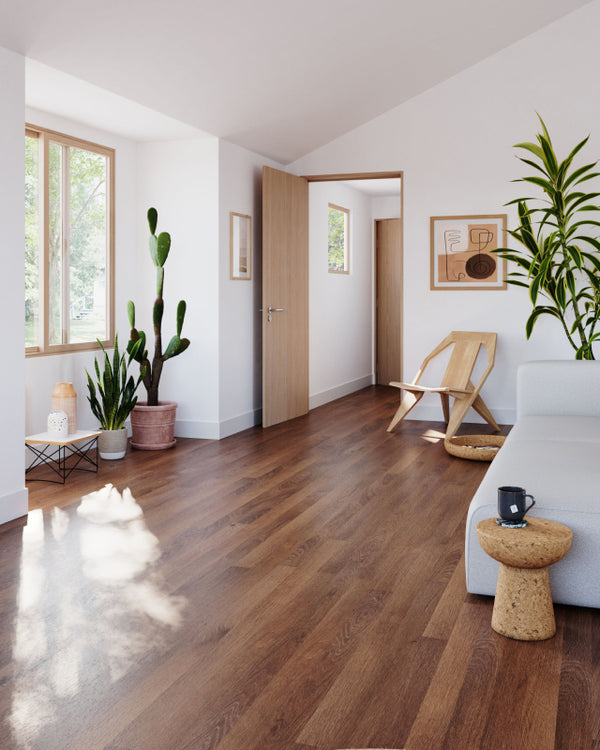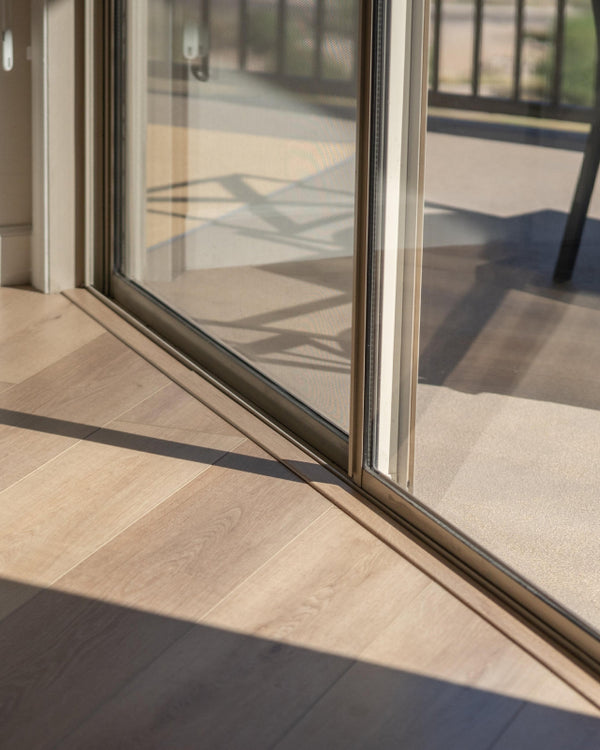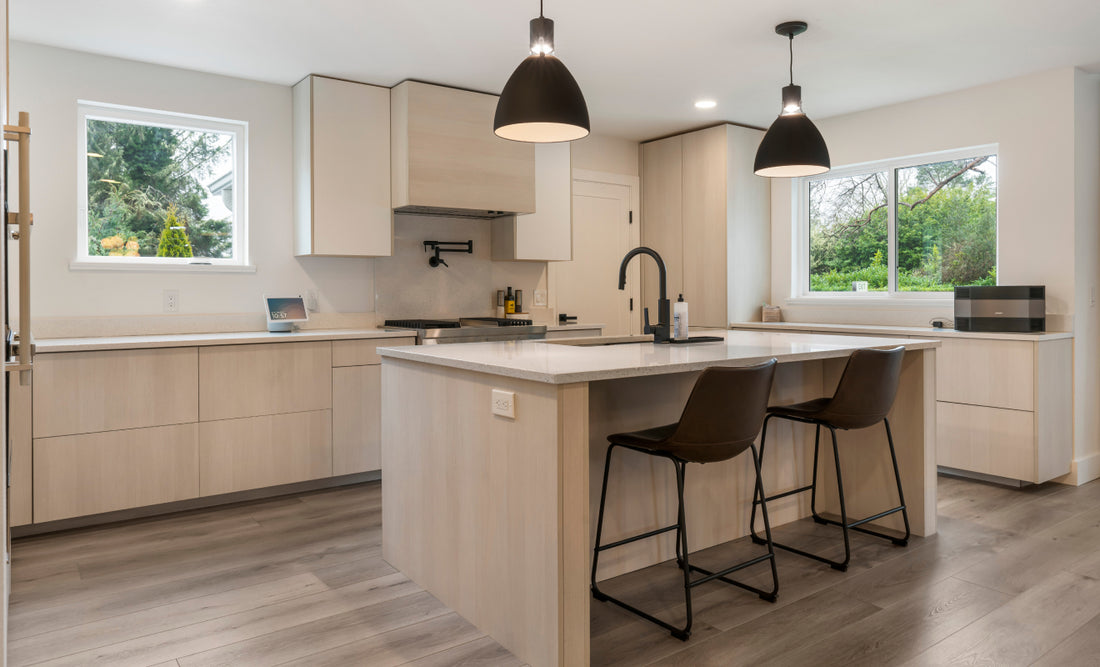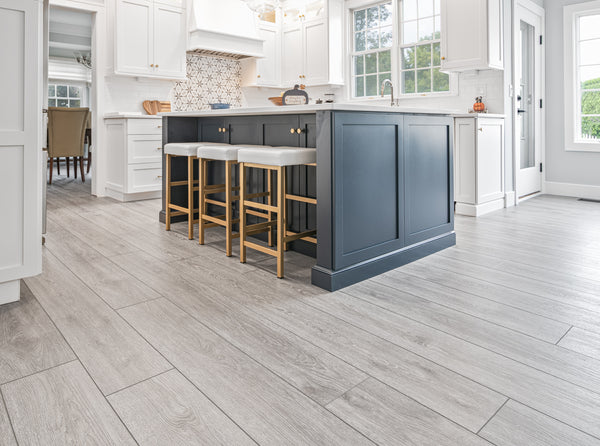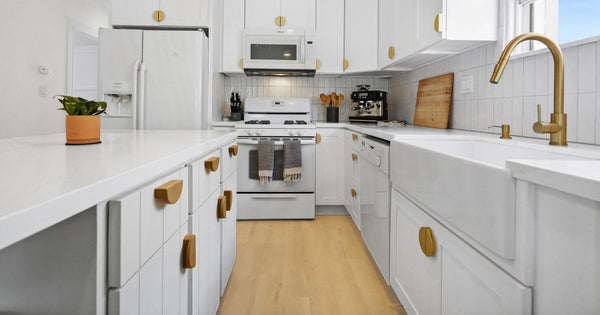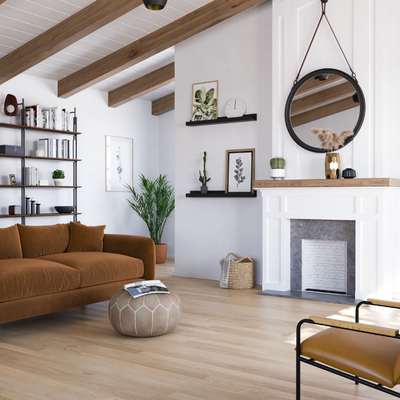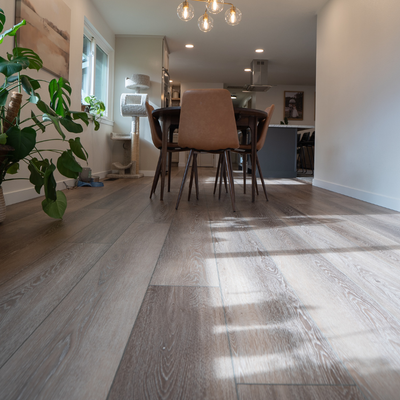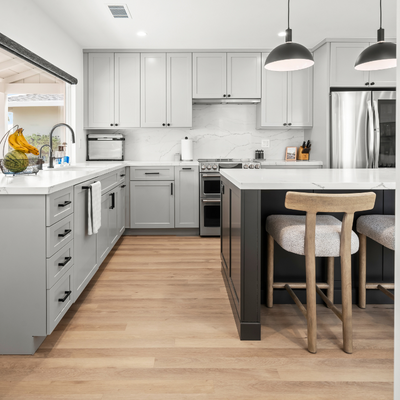Curious about the craze for engineered hardwood? It’s as stunning as solid hardwood, with the luxury of low maintenance and increased durability. Since its creation in the ‘60s, engineered hardwood has taken the building materials industry by storm as an upgraded, budget-friendly alternative to hardwood.
As much as we admire the beauty of solid hardwood and some of the capabilities and features of engineered hardwood, we felt like something was missing. Our passion for top quality and a luxurious look and feel inspired us to launch the Silvan Resilient Hardwood Collection, which combines the ingenuity of groundbreaking technology with the natural beauty of real wood. It comes in five stunning colors and is DIY-friendly, 3x more dent-resistant than typical hardwood, topically waterproof, and built for life.

Read on to see if Silvan is the perfect resilient engineered hardwood flooring for you. We’ll start with the basics of engineered hardwood, compare it to traditional solid hardwood and show how Silvan fills in the gaps between both.
What is Engineered Hardwood? Is it Better than Traditional Solid Hardwood?
Engineered flooring takes a lot of inspiration from stunning traditional hardwood. It is crafted with a natural wood layer on top and utilizes a combination of different materials, often including wood, in its core. It has the same beautiful natural wood look and feel as hardwood flooring without setbacks when it comes to durability, moisture resistance, and other potential issues. Engineered flooring takes all the positive aspects of hardwood and makes them achievable at a lower price point, making beautiful wood-look flooring accessible to a broader range of homeowners and commercial spaces.
The Main Difference Between Engineered and Solid Hardwood: The Core
The core is the most important thing to look for when choosing an engineered hardwood floor. An engineered hardwood core is typically made of plywood or solid birch, which are softer than Silvan’s core.
While engineered hardwood’s wear layer is often mistaken as its primary defense against dents, the true contenders for durability are the layers beneath the hardwood wear layer. Silvan’s core is made out of recycled wood fiber compressed under extreme pressure and heat, resulting in highly dense, moisture-resistant material that makes Silvan 3x more dent-resistant than typical engineered hardwood cores, including those made with solid birch, plywood, or oak.

Silvan is equipped with an FSC® 100% Hardwood wear layer sourced from meticulously maintained European forests. It is also UV-cured with an acrylic coating and is topically waterproof. Read on to learn about its durability and how Silvan outperforms both solid hardwood and engineered hardwood.
What are the Disadvantages of Engineered Hardwood?
Although it is often made with top-of-the-line technology, engineered hardwood can have its drawbacks. Silvan was crafted to perform better than both solid hardwood and traditional engineered hardwood. It’s a new kind of engineered flooring named “Resilient Hardwood.”
Here are a few common questions and concerns about engineered hardwood and how Silvan addresses these issues:
-
Does Engineered Hardwood Have a Low-Quality Core?
- Often with engineered hardwood, low-quality core materials like plywood or birch will reduce the floor’s value and performance. When exposed to moisture, these softer cores are susceptible to contraction and expansion and will also dent more easily than a harder core.
- Our Answer: Silvan’s Resilient core is comprised of a highly dense sawdust composite that makes it 3x harder than hardwood. Silvan is even more stable and dent-resistant than engineered wood because of its wood fiber core.
-
Is Engineered Hardwood Expensive?
- Many companies offer engineered hardwood at a high price point, even compared to solid hardwood, which can run $15 per SF or more.
- Our Answer: We competitively price our collections to offer top-tier specs at unbeatable rates. Silvan ranges from $5.50-$5.95 per SF, depending on the plank size.
-
Does Engineered Hardwood Fade?
- Many customers in the market for durable flooring are concerned about engineered hardwood’s tendency to fade when exposed to direct sunlight.
- Our Solution: Silvan is constructed with a UV-cured acrylic coating that helps to prevent fading and other wear and tear.
-
Is Engineered Hardwood Safe For the Family?
- Hardwood floors are often preferred for their completely natural appearance and lack of plastic or chemical components. A common complaint about engineered hardwood is that it's made with inorganic materials that could potentially harm the environment and your family.
- Our Solution: Silvan, just like all of Flooret’s products, is low-VOC and phthalate-free. It’s also Greenguard Gold Certified, CARB2 compliant, and meets the most strict standards for Indoor Air Quality.
-
Does Engineered Flooring Have a Hollow Sound or Feeling?
- Solid hardwood floors are loved for feeling sturdy and grounded, and it's a common concern that engineered or Resilient Hardwood will echo underfoot.
- Our Answer: Silvan is made to include all of solid hardwood’s best qualities, including having no hollow sound when properly installed and a comfortable texture that makes the flooring enjoyable to walk on. If hollow-sounding flooring is a big concern, you can glue down Silvan Resilient Engineered Hardwood to ensure a solid, stable connection to your subfloor.
-
Is Engineered Flooring Sustainable?
- A typical engineered hardwood wear layer is 4-6 mm thick, resulting in a low yield per log.
- Our Answer: Silvan has a 0.6 mm wear layer, providing 6-10x more flooring from the same quantity of lumber. Our core is made out of recycled wood byproducts – primarily sawdust from furniture milling – which would otherwise be burned or sent to a landfill.
How Durable Is Engineered Hardwood?

Engineered hardwood is more moisture-resistant than traditional hardwood, but Silvan Resilient Hardwood is favored over both solid and engineered hardwood for being the most resistant to moisture and dents. In lab tests, Silvan Resilient Hardwood was found to be 3x denser than solid wood and topically waterproof. It is expertly engineered to last a lifetime and stand up beautifully to anything thrown – or dropped – its way.
Water vs. Engineered Hardwood and Solid Hardwood
Solid hardwood can withstand the occasional spill but doesn’t have the proper mechanisms to prevent water from seeping between planks and penetrating the product. Since it lacks additional engineering and alternate core materials, exposure to the elements (moisture, light, heat, etc.) will wear down solid hardwood flooring over time, just like it would wear down in nature.
What Happens if Engineered Wood Gets Wet?
Engineered hardwood is known to have a higher tolerance to moisture than solid hardwood and is a better choice for spaces that may be prone to spills. However, depending on the installation method and locking mechanisms, water may seep between planks or get underneath your installation, causing your floors to warp, cup, or bubble.
Silvan Resilient Hardwood has a better solution. It is engineered with 5G® Dry™ waterproof technology. This feature enhances the water-tight resilience of the planks, making Silvan topically waterproof, and reduces edge swelling, an issue that occurs when the floor is separated from the subfloor due to excessive moisture. In traditional engineered hardwood installations, edge swelling results in a “cupping” or bubbling effect to the flooring that feels uncomfortable underfoot and ruins the floor’s appearance. Water damage is common in solid hardwood floors that aren’t adequately equipped with a defense against moisture.

With Silvan’s ultra-snug click mechanisms that lock together seamlessly, water isn’t able to trickle through, protecting your floor and subfloor from day-to-day moisture damage.
Choosing Silvan Resilient Hardwood means that you can be confident that your floor will feel amazing to walk on and look beautiful for years to come.
Is Thicker Engineered Hardwood Better?
Many companies advertise their engineered hardwood’s thick wear layer and claim that thicker hardwood wear layers are superior to thin ones. Silvan is constructed with a very thin wear layer made from FSC-certified solid hardwood.
At first glance, a thin wear layer might raise some red flags for someone looking for the highest-performing durable floor. However, wear layer thickness in engineered hardwood flooring doesn’t have the impact that you might expect. In fact, Silvan’s thinner wear layer allows its extremely strong core to do its job in protecting against dents and other damage.
While companies advertising a thick hardwood wear layer often cite how many times their flooring can be refinished, the reality of refinishing an engineered hardwood installation is time-consuming, challenging to orchestrate, and very costly.
In fact, between moving furniture, hiring a crew to sand and then refinish the entire installation, and accounting for the time spent on the project, it is often less expensive to simply replace your full installation with brand-new flooring. And while you are certainly welcome to replace your entire installation, we recommend simply replacing the damaged or worn area with new Silvan planks, which can be done at any time.
Dent Resistance & Refinishing: How Silvan Resilient Hardwood Raises the Bar
Engineered hardwood often comes with a thick hardwood wear layer so it can be resanded over its lifespan. Sanding and refinishing is usually done when the hardwood wear layer has been excessively scratched or scuffed, exposed to water, or faded from prolonged exposure to direct sunlight.

The draw of engineered hardwood flooring with a very thick wear layer is that it can be sanded and refinished. However, ultimately, refinishing tends to be overly expensive, time-consuming, and wasteful since you have to refinish the entire installation to achieve an even color and thickness even if only one area has been damaged.
Silvan’s 0.6mm hardwood wear layer is crafted with patented Woodura® technology. It is fused to the floor’s extremely durable core, so the beautiful natural patterns of the hardwood are supported by Silvan’s core. This mixture eliminates the need for a wood-filler and, as a result, forms a surface that is extremely hard and durable – 3x harder than traditional solid wood.
Do Engineered Wood Floors Scratch Easily?
The biggest draw to engineered hardwood flooring isn’t necessarily scratch resistance but its overall durability compared to solid hardwood while still utilizing a natural hardwood surface. In general, hardwood can withstand some scratches and still maintain its beautiful appearance, but if you’re especially concerned about the possibility of scratches in your installation, consider an option like luxury vinyl planks which tend to have a higher scratch-resistant rating.
Our Modin Rigid Luxury Vinyl Plank Collection is built with a 40 mil wear layer and aluminum oxide scratch-resistant coating that can stand up to any paw or foot traffic that comes its way.
Can I Resand Silvan Engineered Hardwood?
Silvan’s thinner wear layer means that it should not be sanded. However, there are more benefits to this than setbacks.
Suppose your solid or traditional engineered hardwood floor gets damaged in a specific area, and you want to refinish it. In that case, you will have to refinish the entire space even though the other areas of your installation may not need it. Refinishing an installation can cost you anywhere from $5-8 per SF, which is already more expensive than any product in the Silvan Collection (which ranges from $5.50-$5.95/SF).
Refinishing takes time and effort and is ultimately more costly than simply replacing any damaged or worn planks individually (something you can easily do with Silvan).
For example, if you had traditional engineered hardwood installed in a bathroom and the sink overflowed, causing damage to the surrounding planks, you would first need to inspect your subfloor for water damage and potential mold growth. Then, to restore the floors to their original condition and remove any water damage, you’d need to resand the entire room at the very least.
The average bathroom is 36-40 SF, so at $5-8 per square foot for sanding and refinishing, your out-of-pocket costs would be nearly $1,000 to get your bathroom floor to match the hallway and other rooms of your house again. On top of that, you’d need to move out all of your furniture for days or even weeks and undertake significant cleanup after refinishing is complete.
With Silvan Resilient Hardwood, you can simply remove the damaged planks and replace them. For this example, it would require less than one box of Silvan flooring to replace the area around the sink, and you wouldn’t have to worry about damage to the subfloor since Silvan is topically waterproof.
How Long Does Engineered Hardwood Last?
Engineered hardwood flooring has an average lifespan of 20-40 years—the time hardwood flooring can be used before requiring refinishing. Even though traditional engineered hardwood can sometimes be refinished like solid hardwood, Silvan Resilient Hardwood requires less maintenance due to its dent resistance and topically waterproof features.

Barring excessive damage, Silvan will never require a replacement and comes with a lifetime residential warranty and a 10-year commercial warranty. It’s a one-time cost decision compared to an investment in hardwood flooring that will have significant maintenance costs throughout its entire lifetime.
More Possibilities: Where You Can Install Silvan Resilient Engineered Hardwood
As beautiful as it is, solid hardwood can only successfully be installed in areas that can guarantee low exposure to moisture and specific temperature conditions. You can achieve continuity throughout your entire home or commercial space with confidence by choosing engineered hardwood.
Silvan Resilient Hardwood is less susceptible to warping and swelling, making it a better option for humid environments and even bathrooms. It’s also an excellent choice for spaces with radiant heat. Because of its structural integrity, it can withstand radiant heating temperatures up to 80 degrees Fahrenheit.
Silvan Resilient Hardwood can also be laid over concrete, as opposed to hardwood flooring that needs to be fastened to a subfloor. Its DIY-friendly installation options make it accessible for anyone with a few tools to install and achieve their dream flooring.
How Engineered Flooring Brings Value to a Home and the Planet
Hardwood floors are stunning. They can immediately steal the show when walking into a space. Hardwood flooring has been known to increase the value of a home by as much as 2-5%.
Does Engineered Flooring Increase Home Value?
Silvan Resilient Hardwood is crafted with a solid hardwood wear layer and looks indistinguishable from a solid hardwood installation. Plus, it’s more sustainable, budget-friendly, and durable. It has become a popular choice for home flippers, builders, and interior designers for its real-wood look, excellent price point, and attractive features.
Silvan is available in gorgeously wide planks. You can choose between two sizes - 7x78” or 11x86” for Anza and Balboa. Wide plank flooring has roots in both traditional and modern design but is more and more favored nowadays for its luxurious look in any space. If you’re remodeling your home and looking to add value, installing Silvan wide plank engineered hardwood is a great choice that will both look and feel incredible.
Silvan: Good For The Planet
If you love the look of an oak or ash floor, you’ll love the look of the Silvan Collection’s carefully curated colors, which is the real thing – at a fraction of the cost. Silvan is made with real, FSC-certified hardwood that is carefully selected from maintained forests. Silvan’s Woodura® surface technology can make a cut of lumber go 10x further than traditional hardwood flooring.
Silvan’s core is also made of repurposed sawdust that would typically be burned or sent to a landfill. Flooret is incredibly proud to use a technology that makes such a durable floor out of materials that would otherwise be wasted, enforcing our mission to minimize our carbon footprint and impact on the environment.
Completing the Flooret Family
The Silvan Resilient Hardwood and the Modin Rigid Luxury Vinyl Plank Collections are two groundbreaking flooring solutions that raise the bar in the building materials industry.

Deciding Between Luxury Vinyl or Resilient Hardwood
Now that Flooret offers two excellent flooring options, the real question is: which is best for me? The good news is that it’s hard to go wrong. Both the Modin and Silvan Collections are high-achievers in durability, appearance, and price. However, there are some cases in which one of these collections may be a better choice for you.
What’s the Most Durable Flooring: Vinyl or Engineered Hardwood?
Silvan Resilient Hardwood is like hardwood, but better – it’s more tolerant to moisture and foot traffic and leads the charge in sustainability. Silvan is comprised entirely of natural materials, making it an extremely earth-friendly product. However, this also means that Silvan cannot be 100% waterproof to the core like Modin is.
Although Silvan is topically waterproof and has a remarkable click-lock system that prevents water from seeping through for an extended period of time, Modin Luxury Vinyl Plank is 100% waterproof to the core. No amount of water can harm it, even in the case of a flood.
While thin wear layers are an advantage in the engineered flooring space, the opposite is true in the vinyl flooring space. While the industry standard is typically 7 mil for vinyl flooring, the Modin Collection starts its spec at a 20 mil wear layer. It is also available with a 40 mil wear layer, making it an excellent choice for commercial spaces or homes with a lot of foot or paw traffic.
The Modin Rigid Luxury Vinyl Plank Collection is ideal for people who are tough on their floors. Our luxury vinyl flooring mimics the stunning wood patterns of Silvan or solid hardwood but is crafted with highly durable materials such as limestone and virgin vinyl that make it the #1 contender when it comes to durability.

If you’re having trouble deciding, read on to see what fits your lifestyle best.
Modin Luxury Vinyl Plank is the Best Choice For You, If:
- You own a home that is exposed to moisture daily (i.e., significant rain, a pool, or near the beach) and want a floor that is 100% waterproof.
- Your home or commercial space gets a lot of foot and paw traffic, so you need the extra scratch resistance and thick vinyl wear layer.
- You want more variety in flooring colors.
Silvan Resilient Engineered Hardwood is Best For You, If:
- You want the authentic look and feel of natural hardwood but with added durability.
- You want flooring made with sustainable materials.
- You are looking for budget-friendly hardwood flooring without sacrificing quality.

Both collections are carefully curated without compromising craftsmanship, quality, durability, or sustainability. Read more about the Modin LVP Collection and the Silvan Resilient Hardwood Collection on our website, and order a sample today to see them for yourself.
